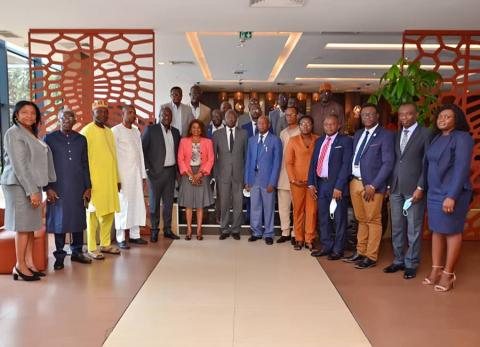STAKEHOLDERS VALIDATE ECOWAS STANDARDS ON BIOETHANOL AND CLEAN COOKSTOVES
The Acting Executive Director of ECOWAS Centre for Renewable Energy and Energy Efficiency (ECREEE) has said that the ECOWAS Bioenergy policy seeks to ensure universal access to clean, safe, affordable and sustainable energy access including cooking energy solutions by the year 2030 in the sub-region. Mr. Bah F.M. Saho made the remarks on Thursday 26th August 2021 during the ‘validation workshop on ECOWAS Standards on Bioethanol for cooking and transportation and also for cookstoves’ held in Abidjan in Cote d’voire. He said the policy aims to facilitate the transition from the use of inefficient and unsustainable bioenergy resources and boost the utilization of renewable energy fuels to 5% within the same period.
Speaking at the two-day forum, Mr. Saho dilated on the sub-region’s energy challenges, citing high dependency on traditional biomass and fossil fuels and the important strides taken by the ECOWAS Commission towards addressing the conundrums. He said the ECOWAS Heads of States adopted the ‘ECOWAS Energy Protocol’ in 2003, the ECOWAS/UEMOA ‘White Paper on Access to Energy Services’ for rural and peri-urban populations in 2006 and established ECREEE in 2008 all geared towards promoting energy efficiency through increased use of renewable energy resources.
The Acting Executive Director of ECREEE said since its establishment, the agency has recognized the lack of robust and inclusive renewable energy policy framework as one of the main barriers affecting the promotion of sustainable energy in the ECOWAS region. He also noted that ECREEE and its partners developed the ECOWAS programme on safe, sustainable and affordable cooking (WACCA) in a bid to enhance the use of clean, safe, and affordable cooking energy solutions. According to Mr. Saho ECREEE further developed four policy instruments including renewable energy and energy efficiency, as well as Bioenergy and Gender mainstreaming in energy access.“These policy documents have provided the enabling environment in ECOWAS member states to strategize their national action plans as the basis for promoting market penetration of sustainable energy services”, he noted.
Reports have shown that the ECOWAS Region has one of the lowest energy access rates in the world with less than 50% of its population having access to electricity and under 25% having access to sustainable energy cooking solutions. ECREEE Boss thus called for concerted and all-inclusive approach towards improving what he described as a gloomy situation.





